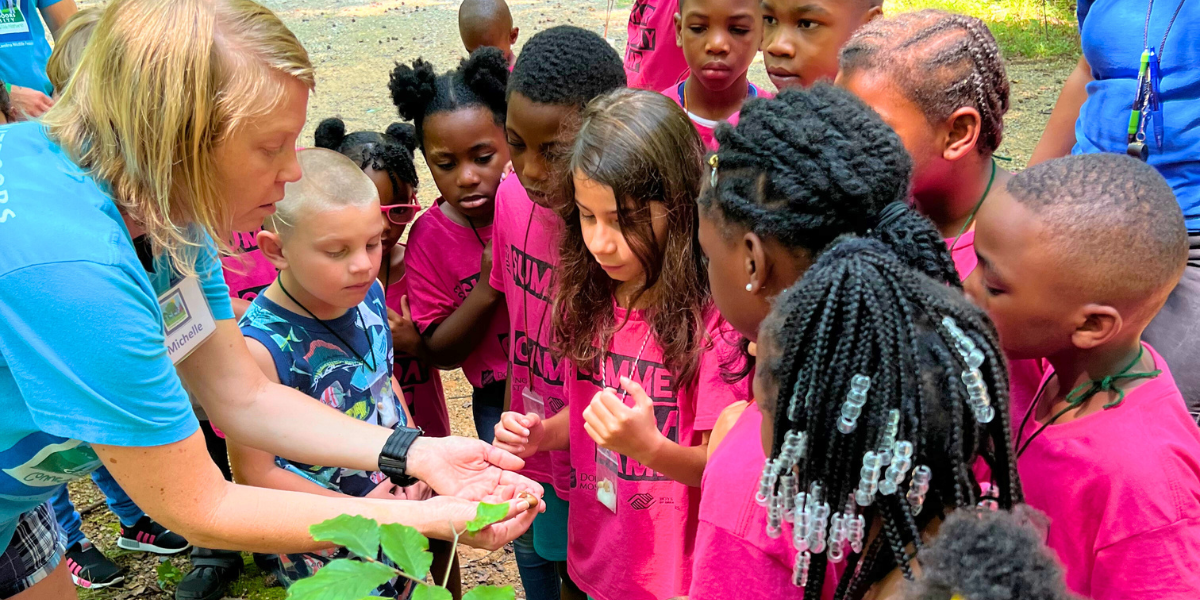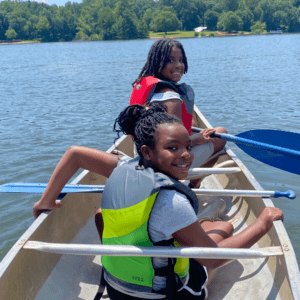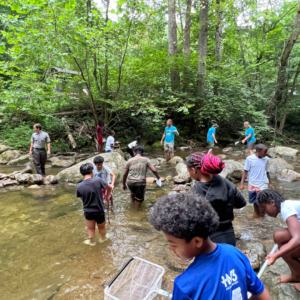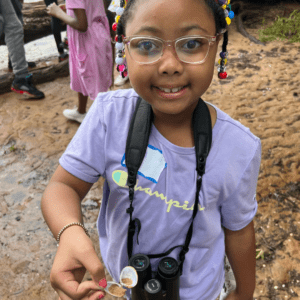From Students to Stewards: A Conversation with Great Outdoors University Director Mary Bures

Conserving and protecting wildlife in North Carolina is an endless task, a simultaneously urgent and never-ending calling. The undeniable impact of development, population growth, climate change, and habitat degradation is a devastating problem with compounding negative impacts and – unfortunately – one that is not going anywhere any time soon.
NCWF is dedicated to standing with organizations across the state to lead the charge in standing up for wildlife and habitat. But the work could not be done without people: people who understand the value of ecological diversity, outdoor engagement, and the species with which we share our state. This requires an alliance of people who are diverse in age, ethnicity, and background.


 But the grim reality is that young people are becoming increasingly disconnected from nature and the wildlife within it.
But the grim reality is that young people are becoming increasingly disconnected from nature and the wildlife within it.
While the direct harm this disconnection from the outdoors has on the health of children is obvious, there are many other unapparent dangers, as well. Namely: what is to become of wildlife and habitat if the next generation is not aware of its value? Why would they care about the outdoors if they have little to no interaction with it? Who will protect wildlife and habitat once we – the generations privileged enough to possess an experiential appreciation for it – are gone?
NCWF’s Great Outdoors University (GoU) directly addresses these questions. GoU provides the opportunity for children and families to engage with wildlife and the outdoors through hands-on outdoor learning, tactile activities, and day trips to natural spaces in their own neighborhoods. The goal is to directly address the ever-increasing nature deficit in North Carolina’s children, engaging each child as a whole – mind, body, and spirit.
We sat down with Great Outdoors University Director Mary Bures to ask her a few questions about the impact of GoU, and the challenges it faces in plugging children into nature.
Q. What is your position with GoU and how long have you been working here?
Mary: I am the Director of Great Outdoors University. I was hired in October 2012 to develop and implement Great Outdoors University for NCWF which now includes over 40 curriculum options, 48 participant partners, and 43 destination partners.
Q. What do you think the value of GoU is?
Mary: GoU breaks down the barriers that prevent children of all ages from connecting with and experiencing nature. The GoU experiences enhance a child’s problem-solving, creativity, and team-building skills.
 There is no better teacher than the natural world, which is full of great examples of organisms working together and has served as the inspiration for many inventions. Experiencing and engaging in the wonders of nature helps the whole child – mind, body, and spirit.
There is no better teacher than the natural world, which is full of great examples of organisms working together and has served as the inspiration for many inventions. Experiencing and engaging in the wonders of nature helps the whole child – mind, body, and spirit.
Research shows that getting out in nature improves a child’s overall health and well-being. Increased physical activity helps reduce the risk of obesity, diabetes, and heart disease and it reduces stress, anger, aggression, depression, and suicides.
Outdoor experiences also boost performance in reading, science, math, writing, and social studies. These GoU experiences can contribute to improved focus and attention and a decrease in disruptive behaviors and ADHD symptoms. Immersive nature experiences are linked to improvements in children’s self-esteem, self-efficacy, and resilience.
Experiences like GoU help children know and understand that we are all part of an interdependent web in nature to be cherished, appreciated, respected, and cared for, nurturing better stewards of the environment.
Q. How many participants does GoU have a year? What are the largest takeaways from those participants?
Mary: We have served over 115,000 participants over the years, on average 10,000 annually, through day trips and events. Of course, as you can imagine, the COVID pandemic disrupted programming and participant partners like Boys and Girls Club of Greater Charlotte continue to build their numbers back up.
GoU participants have overcome their “fears” of nature while hiking or canoeing. They have increased their appreciation of nature as they learn more about it. Some participants have made commitments to get outside and explore and learn more – and litter less! Many participants are excited to come back and experience another outdoor adventure with GoU.
The word most often used to describe GoU is ‘awesome’!
Q. What is your hope for GoU moving forward?
Mary: My hope is that GoU continues to improve and expand exponentially, touching more lives with the many benefits of experiencing and growing to understand, love, appreciate, respect, and care for nature. And that the lives impacted by the GoU experiences pay it forward by creating a world where all life is valued, appreciated, and cared for with a recognition that we are all connected.
Q.What is the problem that GoU is working to address? How do you measure progress or success?

Mary: GoU is working to address the “nature deficit” that people – and especially youth – are facing. American children ages 8 to 18 average nearly eight hours a day looking at electronic screens (Kaiser Family Foundation, 2010). Further, the Children and Nature Network reports kids spend less than 10 minutes a day playing outdoors. This is affecting their overall health and well-being. We provide GoU programs at no cost to break down barriers that exist accessing the great outdoors and provide youth opportunities to have fun while learning and experiencing our natural world.
Our curriculum options are designed to ignite curiosity and excitement in ways that encourage continued learning and environmental stewardship. We also host family fun day events that provide families with opportunities to have fun enjoying the many benefits of nature while creating lifetime memories.
We worked with a team from Appalachian State University to design our evaluation tools for the program. These tools include pre- and post-evaluation of participants, leaders, chaperone evaluation, interviews, and observational techniques. The feedback is used to ensure GoU achieves its goals and outcomes and makes necessary changes to improve program effectiveness.
Q. If money wasn’t an issue, what would you want to do through GoU and why?
Mary: If money was not an issue, I would work to expand the GoU experiences statewide and formalize a model that could be implemented across the country. This would include not only an expansion of the day trip model but also the development and implementation of a family engagement model to be implemented in partnership with NCWF’s grassroots/chapter network and affiliate partners. I would create a youth incentive program where they could earn various tools and items that would be useful on their adventures outdoors. This could lead to opportunities for internships/jobs and college scholarships.
GoU is made possible through the generous grant support from The Carrie E. and Lena V. Glenn Foundation, NCWF Charlie Shaw Society, and others.
To learn more about GoU and opportunities to get outside with the kids in your life, visit www.ncwf.org/great-outdoors-university.

